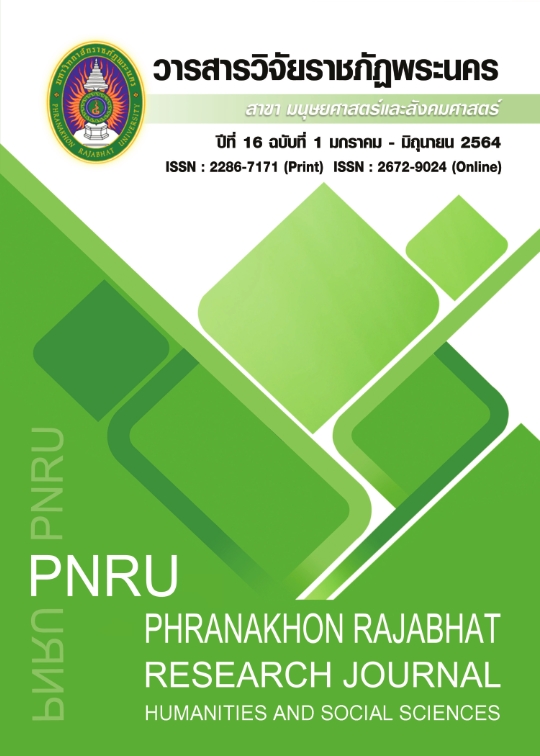CULTURAL AND HERITAGE IDENTITY STUDY FOR LOCAL TOURISM OF PAKPLI DISTRICT, NAKHON NAYOK PROVINCE
Main Article Content
Abstract
The research objective was to study the cultural and community heritage identity for local tourism of Pakplee District, Nakhon Nayok Province. This research was mixed methodology between qualitative research and quantitative research. The research instruments for collective data were 1) interviewing 11 key informants: the community leaders, community philosophers, village headman, and headman 2) surveying identity culture and community heritage from 525 sample people in Pakplee District, Nakhon Nayok Province. The descriptive statistics were frequency, percentage, mean, and standard deviation. The inferential statistics were independent t-test and F-test. The research result was found that there were 10 cultural identities in this community: 1) religious traditions 2) dialect 3) sticky rice tradition 4) local food 5) tourist attractions 6) local wisdom 7) local dress 8) traditional beliefs 9) performing arts and 10) traditional rice farming. In addition, people who were different in ethnic, district, education, and occupation; had a statistically significant difference in cultural and community heritage identity opinions.
Article Details
Each publish articles were copyright by Phranakorn Rajabhat University
Any contents which appeared in each articles in the journal were authors personal opinion. It did not relate to Phranakorn Rajabhat University and other instructors in the university. Each authors would take responsibility on their articles. If there are any mistake, the authors will take responsibility themselves
References
Kanpanuek, C.& Ponkaew, C. (2009). Finding The Identity of Phetchabun Rajabhat University by Participation. Phetchabun : Phetchabun Rajabhat University. (in Thai)
Suratsawadee, C., Tanaspansarrat, P., Suratsawadee, W., Janjamsai, M. & Booranasing, B. (2016). Managing the Cultural Heritage of Smor Riang for Sustainable Cultural Tourism by Community Participation. Bangkok : Phranakhon Rajabhat University. (in Thai)
Department of Tourism. (2018). The Tourism Development Strategic Plan2018-2021. Retrieved June 19, 2020 from https://www.dot.go.th/storage/%E0%B8%81%E0%B8%A5%E0%B8%B8%E0%B9%88%E0%B8%A1%E0%B9%81%E0%B8%9C%E0%B8%99/5V7jtvCF7hvNiPXPU7MOdT7giHiF1ZbRokN8nBVx.pdf (in Thai)
Department of Cultural Promotion, Minister of Culture. (2016). Culture Lifestyle and Wisdom. Bangkok: Rungsilp Printing. (in Thai)
Pongponrat, K. (2017). Overview of the Situation and Trends in World Tourism Department, Asiann and Thailand. Retrieved December 16, 2018 form http://msi.citu.tu.ac.th/public/upload/2.Trends%20and%20Issues%20of%20Tourism.pdf (in Thai)
Promnimitkul, K. (2015).The Cultural Identity…Maintain or Destroy Community Identity. In the book tells the Story of the Community, the xperience, and the Lesson Learned from the Community. Bangkok: Chulalongkorn University Printing House. (pp.105-134) (in Thai)
Yaownanon, K., Supasetsiri, P., Nopudomphan, K., Inchan, N. (2019). Thai-Phuan Symbols: study of Identity of the Thai-Phuan Community in the Central Region of Thailand for the Purposes of Determining a Design Framework. Institute of Culture and Arts Jounal Srinakharinwirot University, 21(1), 166-185 (in Thai)
Pongnak, I. (2014). The Community Identity of the Ancient Town of U-Thong, Suphanburi Province. Bangkok : Chulalongkorn University. (in Thai)
Sukkasem, M. & Siriwong, P. Thai Phuan Identity Existence of Bandong Homestay through Sustainable Creative Tourism Context. Retrived August 28, 2020 from file:///C:/Users/NW/Downloads/105630-%E0%B9%84%E0%B8%9F%E0%B8%A5%E0%B9%8C%E0%B8%9A%E0%B8%97%E0%B8%84%E0%B8%A7%E0%B8%B2%E0%B8%A1-268532-1-10-20171215%20(1).pdf (in Thai)
Sae-Ueng, P. (2013). The Settlement and Development of Laos Ethnic in the Eastern Region: Dynamic in Thai Society Context. Chonburi : Burapa University. (in Thai)
Bunnak, R. (2013). Cultural Heritage. Retrived July 28, 2019 from http://www.marutbunnag.com/article/407/ (in Thai)
Khunphon, S. (2014). The Design and Development of Printed Media for Educate to Cultural Identity of Kohyor Community. Songkla: Taksin University. (in Thai)
Plianroong, S. (2010). Communication for The Construction, Maintain and Negotiation of a Monness Identity by a Diasporic Ethnic Mon Group under Globalization Currents. Bangkok : Chulalongkorn University. (in Thai)
Choiboomroong, T. (November 18, 2015). Sustainable Tourism Management. Retrieved October 2, 2018 from https://www.youtube.com/watch?v=_L3paNCs494 (in Thai)
Thairath Online. (June 11, 2020). Tourism Income Lost 7.5 Billion. Retrieved November 13, 2020 from https://www.thairath.co.th/news/business/1865918 (in Thai)
Sungkharat U. & Taweeburut T. (2015). Identity and Community-based Tourism Management in Southern Thailand Ecotourism Attractions. Songkla: Prince of Songkla University. (in Thai)


